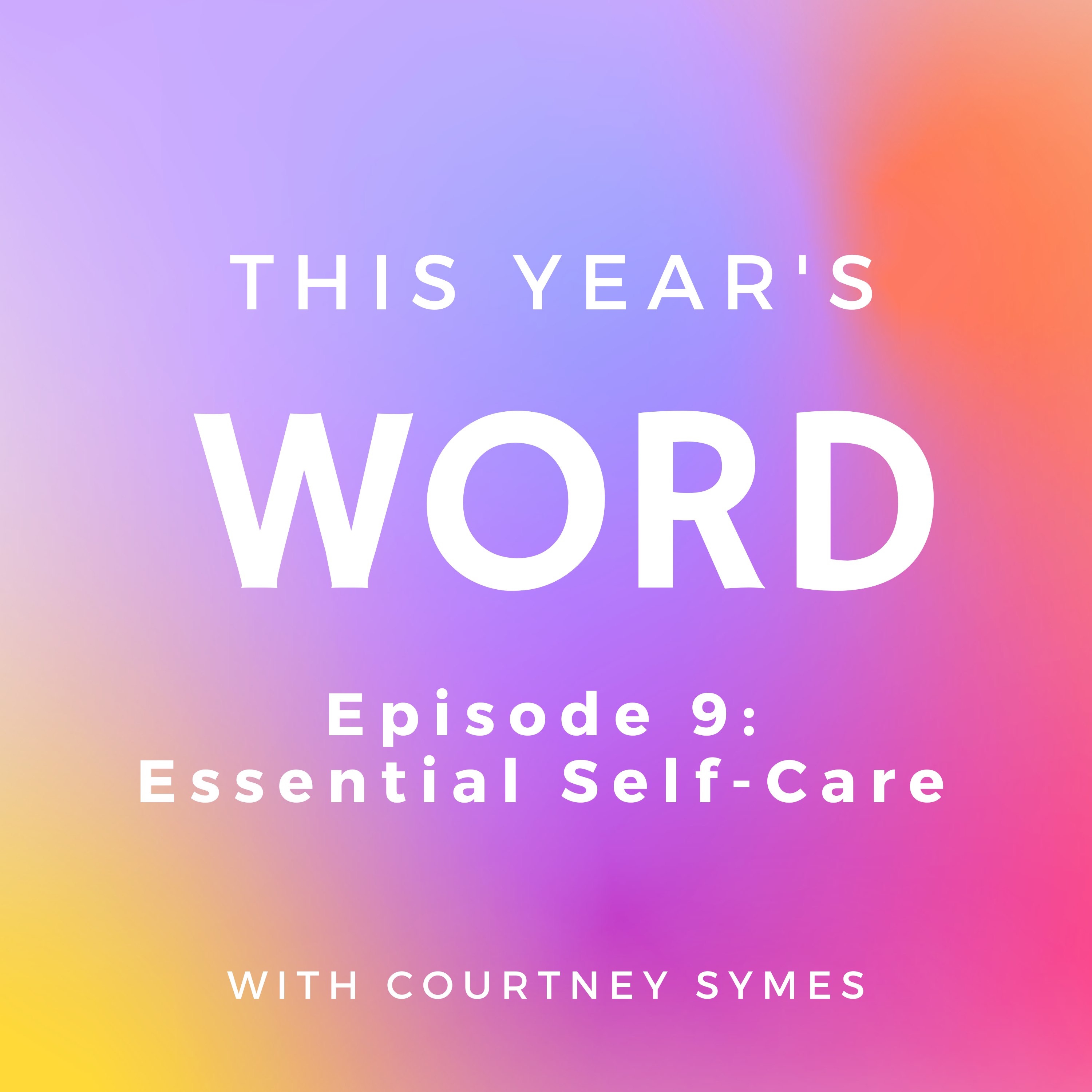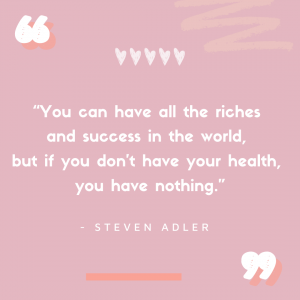This Year’s Word Podcast Shownotes: Episode 9, Essential Self-Care

Hello and welcome to This Year’s Word Podcast, I’m your host, Courtney Symes. I’m an author, entrepreneur, mum, and wife. In this podcast series, I will share my Word of the Year experience as I explore the meaning of the word “Love” and how you can use this word to change your life, one day at a time.
Today’s episode is the last in our love the skin you’re in series. To wrap up this series, I will be talking about self-care essentials, which are activities we must do in our lives in order to maintain optimal health and well-being. Essential self-care practices include: sleep, taking care of the skin we’re in with regular skin checks, fuelling our bodies, as well as supporting each other to make positive health choices and changes.
Let’s begin this episode discussing something we do for a third of our lives – sleeping.
I have always loved sleep, and generally never had a problem falling asleep, or staying asleep. In fact, I fall asleep pretty much as soon as my head hits the pillow, and I can sleep through just about anything. Lucky me, right? My poor husband is not quite as fortunate. His active brain keeps him awake until all hours. When he does manage to fall asleep, he is still a light sleeper, so if he is woken during the night for any reason he’ll be lucky to get back to sleep.
We all have a different relationship with sleep. For many, many years, sleep has been the first thing I compromise if I’m working to a deadline, or even just socialising. The dialogue in my head assures I can always catch up on sleep, or if I ‘snooze I lose’, and need to sacrifice sleep if I want to get ahead of the game. It wasn’t until I read Arianna Huffington’s book, The Sleep Revolution, that I fully understood the science behind sleep and why it is essential. Reading this book helped me identify what a ‘good night’s sleep’ looked like for me. For example, I’ve learned if I get to bed before 10 pm, I can get up at 5 am to squeeze in a couple of hours of work before the kids wake up. For me, two hours in the morning are worth four hours late at night when I’m tired and distracted by the day’s events.
Sleep impacts our bodies in such profound ways – from cognitive function to immune response. Immune response is a profound indicator of lack of sleep for me personally. When my children were small and waking multiple times during the night, I found myself sick frequently. It didn’t help that my children were also sick regularly, as they were building their immunity in their early years, but I always seemed to catch what they had. We’ve since had a number of bugs sweep through our house, and as long as I’m well rested, I seem to evade most of them.
Sleep also has a huge impact on my mood. Like most people, when I’ve haven’t had enough sleep I become snappy and short with my family, and generally unable to make basic decisions or deal with minor challenges that arise. In fact, I’m generally pretty unpleasant to be around.
In her book The Happiness Project, Gretchen Rubin references a study that suggests, “getting one extra hour of sleep each night would do more for a person’s happiness than getting a $60,000 raise”. Wow!
So, what can we do to be more proactive about our sleep? Here are a few things I’ve done to establish a healthier relationship with sleep:
- Identify your core sleep time by asking: how much sleep do you need to feel refreshed? Are you a “night owl” or “early bird”? For example, if I get to bed by 10pm at the latest, I can wake up at 5am feeling like I’ve had a good night’s sleep. I’m an early bird and find my brain functions better in the morning. If there’s deep work to be done, I’m much better with this in the morning, rather than burning the midnight oil. A side note: I wasn’t always an “early bird”. During university I was definitely a “night owl”, and worked best work between the hours of 8pm-2am, so be open to your sleep patterns changing as you get older.
- Establish good “sleep hygiene” with a sleep routine that works for you. Consider all the activities you do two hours before you go to bed. How conducive are these activities to helping you wind down for sleep? Are these activities quiet and restful, or do they keep you stimulated and alert, such as a vigorous workout vs. some gentle stretching, or coffee vs. herbal tea? My sleep routine includes a warm bath, drinking herbal tea, reading a calming book (nothing too thought-provoking), dimming the lights and avoiding too much screen time. I confess I can’t completely ditch the screens, and am guilty of sometimes having a cheeky glance at my phone or laptop.
- Be consistent. Once you have reviewed how you spend the two hours before bedtime and decided what to add or remove to optimise your sleep routine you need to commit! It’s great if you’re practising a healthy sleep routine during the week, but if it all goes out the window on the weekend when you want to stay up late socialising or watching Netflix, you’re back to square one. Sadly, as I learned from Arianna Huffington’s book, The Sleep Revolution – contrary to popular belief – we can’t “bank” sleep. That is, a couple of late nights can’t be fully repaid with a couple of early ones. The “sleep bank” remains in deficient. Likewise, the Sunday morning sleep-in can do more harm than good as it messes with our sleep patterns.
Some of these suggested activities might seem really obvious, for example, most of us are aware that screen time is not recommended before bed. However, over the next week I challenge you to keep a record or journal of the activities you partake in before bedtime – it’s an enlightening exercise!
The next self-care essential I want to explore is taking care of the skin you’re in…by getting a skin check. I have very fair skin that has always been susceptible to burning. I know I am at risk from long-term skin damage, so endeavour to get my skin checked by a professional every year.
A few years ago, my husband and I found a brilliant GP that specialises in skin checks on the Sunshine Coast, where we travel every year to visit family. Given that getting my skin checked and visiting family both fell as annual events, I decided the easiest thing to do was pair both, which went like this:
- Book trip to Sunshine Coast
- Book appointment with skin specialist
Given that we book leave from work and plan our trip several months in advance, this has been an effective strategy so far. The COVID pandemic did prevent us from traveling last year, so I found another skin specialist here locally who we are happy with, and will use in future if we can’t get to Queensland again.
The beauty of getting this potentially mundane task done while we’re on holiday is so we can make the most of it. We leave our kids with family and take a couple of hours to get our skin checked, followed by a rewarding coffee date afterwards. This makes the task seem much less arduous and (almost) enjoyable!
In between skin checks you should always be keeping an eye on your skin and monitoring any changes. Here’s how to do it:
- Know your skin type. For example, if you’re fair like me and have experienced a lot of sun damage and exposure in the past, make skin check appointments a non-negotiable priority.
- Book it in. Make your next appointment before you leave the clinic – it won’t happen unless it’s in your calendar.
- Find the right specialist for you. Find someone you are comfortable with seeing you in your undies. Whilst I’m sure they’ve seen thousands of semi-naked bodies before, if you’re uncomfortable you’re much more likely to pike out. Try a couple of different specialists until you find “the one” for you, then stick with them. At every appointment they make records of what they have observed, which are helpful to refer back to if necessary.
- Follow MoleMap’s ABCDE checklist, which stands for:
Asymmetry – the shape of one half doesn’t match the other.
Border – the edges are often ragged, notched, blurred, or irregular in outline; the pigment may spread into the surrounding skin.
Colour – the colour is uneven. Shades of black, brown, and tan may be present. Areas of white, grey, red, pink, or blue may also be seen.
Diameter – the size changes and usually increases. Typically, melanomas are at least 6mm in diameter (the diameter of a pencil).
Evolving – look for new moles or changes to existing moles.
- Check your whole body and keep a record. Recruit the help of your partner or a friend to check your back and hard-to-see places. Take photographs of anything suspicious so you can monitor any changes against the photographs.
Throughout my Year of Love, I identified that one of my favourite ways to show love to my family was by cooking them healthy food. Cooking can be challenging when you’re trying to cook quickly during the week, but I personally love having time on the weekend to lovingly prepare a meal. I have time to not only source quality ingredients, I can also – children permitting – spend hours in the kitchen prepping and executing fabulous food.
Throughout my Year of Love, I discovered the keto diet, which I had tremendous success with, and talk more about in my book, A Year of Love: Finding peace one day at a time. To summarise briefly – cutting out sugar and reducing carbs had a positive impact on my metabolism, keeping me fuller for longer, and I lost a bunch of weight.
I realised my success with this diet by:
- Being organised and preparing meals and snacks in advance, such as making lunch for myself when I made the kid’s lunches in the morning, and batch cooking on weekends.
- Being persistent and committed by establishing healthy habits.
- Not beating myself up if I feel off the wagon or had a bad day – I’d just jump straight back on the next day!
- Understanding that smaller, incremental changes are better than extreme changes that aren’t sustainable.
- Getting inspired by trying new recipes and new foods
My final self-care essential is supporting each other for success.
For many years I dragged my poor husband around numerous fun runs as a spectator when I took up running. As much as I love fun runs, they can be pretty boring to hang around for the whole time as a spectator – unless you’re standing at the finish line, where all the excitement happens.
Fast-forward over a decade, and my husband unexpectedly (but happily) kick-started a weight loss regime when he contracted the flu one year. In the week that he was ill, he lost 5kg, but kept the momentum going even after he’d recovered.
A couple of months later, the workmates my husband did group training with decided to enter a Spartan Race as a team. They spent weeks preparing for the event together. I was so proud of my husband’s diligent training to reach his goal of completing every obstacle on the course. On the day of the event, they encouraged spectators to come and cheer the teams on, so the kids and I decided to support Daddy and his team as they made their way around the gruelling obstacle course. The kids were thrilled to watch daddy give his all as he completed each obstacle “ninja warrior” style. I was thrilled to finally be able to return the favour to my wonderful husband after all those frosty morning fun runs as his ‘support crew’.
Here’s how to offer support to your nearest and dearest for their ultimate success:
- Find out how they want to improve their health, and what their goals are. Spend some time discussing this in depth to determine why they want to make these positive changes. That way you can determine what motivates them, and how to support them in the best way possible.
- Give them permission to rally you – especially on the tough days when they need a cheerleader in their corner. This might include working out with them, cutting back on alcohol together, or preparing healthy meals together. This is especially important if you live to together as it can be challenging for the person trying to change their habits to avoid temptation, like watching their partner down a large glass of wine whilst they are trying to abstain.
- Offer them your unconditional love and support. There will be times when they are tired and irritable and just need a hug or a few encouraging words. Look for ways you can support them along their journey. If you usually catch up over a meal and a few drinks, suggest going for a walk together instead. If you are purchasing food for the household, prioritise healthy options and leave the tempting chocolate and chips at the supermarket. Chances are they’re making this change for you and your family, so let them realise the infinite benefits of a healthy lifestyle.

I hope this episode has persuaded you to see the importance of these self-care essentials. Our health and wellbeing really is one of the most important aspects of our lives – as Steven Adler would say, “You can have all the riches and success in the world, but if you don’t have your health, you have nothing.”
Be sure to check out my new book, A Year of Love: Finding peace one day at a time, where I share more of my self-care experiences as well as tips and tricks to optimise your own self-care practices. You can find it at alittlepinkbook.com/books.
Thanks for listening, and I hope you can join me next time.
I’ll leave you with today’s manta: Self-care is essential. If we don’t look after ourselves, we can’t look after the ones we love the most.
